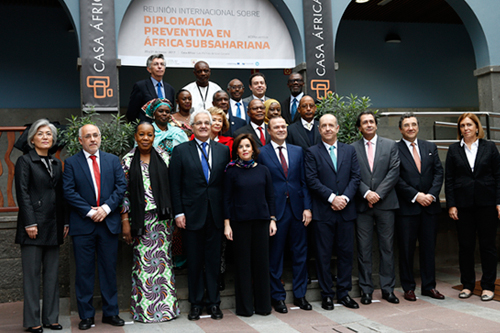The vice-President of the Government, Soraya Sáenz de Santamaría, opened the international meeting about the preventive diplomacy in Sub-Saharan Africa
News - 2017.3.22
In her opening words, the Vice-President of the Government pointed out that preventive diplomacy constitutes a raft of mechanisms and instruments designed to avoid hotspots of tension developing into outright conflicts, with incalculable human and material costs and social upheaval that take many years to heal. Conflict prevention encompasses a broad spectrum of actions, from classical diplomacy to development policies, including the prevention of extremism and gender policies.
Prevention-based diplomacy is one of the cornerstones of the mandate of the current Secretary-General of the United Nations, Antonio Guterres. During its recently-concluded term on the Security Council, one of Spain's top priorities was the promotion and development of preventive diplomacy. The meeting in Las Palmas on Sub-Saharan Africa provides continuity to the meeting on preventive diplomacy in the Mediterranean, held at Casa Mediterráneo (Alicante) in June 2016.
The meeting in Las Palmas included the participation of figures of great political standing on the African continent, such as the aforementioned Catherine Samba-Panza, whose role has been crucial in the political transition of her country, and the journalist and winner of the Prince of Asturias Award for Concord, Caddy Adzuba.
Other participants included senior United Nations and European Union officials, as well as leading figures in African multilateralism, representing the following regional organisations: the African Union (AU), the Economic Community of West African States (ECOWAS), the Intergovernmental Authority on Development in East Africa (IGAD), the New Partnership for Africa's Development (NEPAD) and the G5-Sahel. Also noteworthy was the contribution to the debates by the former Vice-President of the Government and current President of the Women for Africa foundation, María Teresa Fernández de la Vega.
The work was structured in three panels which debated the following issues respectively: diplomacy for peace and prevention of violent extremism, the role of women in peace in Africa and the role of African multilateral bodies in peace and development. During the course of these working meetings, the role of preventive diplomacy to guarantee peace and stability in a region that is growing and integrating, whilst still subject to tremendous political, economic and ethnic tensions, was viewed as positive.
At the end of the debates, the State Secretary for Foreign Affairs, Ildefonso Castro, proceeded to read out the conclusions, which contained concrete proposals made by the panellists to make these mechanisms more effective. In his closing words, the State secretary underlined Spain's commitment to preventive diplomacy, which is providing increasingly visible results thanks to the efforts and dedication of such people as the participants in this conference, and pointed out that "in Las Palmas we have opened up a path - raising awareness of preventive diplomacy in Sub-Saharan Africa - that is destined to last".





